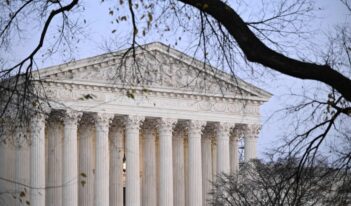
The U.S. Court of Appeals for the D.C. Circuit avoided ruling on FINRA’s authority, the CFTC may be growing in authority, and more…
IN THE NEWS
- The U.S. Court of Appeals for the D.C. Circuit ruled that the Financial Industry Regulatory Authority (FINRA)—a private corporation that monitors and regulates key areas of the securities market—may not expel one of its members, Alpine Securities Corporation, before the U.S. Securities and Exchange Commission (SEC) reviews the expulsion order. The D.C. Circuit reasoned that such an expulsion would cause irreparable harm to Alpine Securities, effectively shutting down its business prematurely. The narrow ruling avoided addressing broader constitutional questions about FINRA’s authority, such as its compliance with the private nondelegation doctrine, “which requires that a private entity statutorily delegated a regulatory role be supervised by a government actor.”
- The U.S. District Court for the Southern District of Mississippi issued a preliminary injunction against a recent U.S. Department of Labor rule that strengthened labor organizing protections for agricultural workers on temporary visas. The rule safeguards the ability of these workers to advocate improved working conditions, including protections against employer retaliation and rights to representation during interviews. The plaintiffs, who included several agricultural organizations and state entities, argued that the Labor Department overstepped its statutory authority and infringed on employers’ free speech. The district court sided with the plaintiffs, finding the Labor Department likely exceeded its authority, and halted enforcement of the rule pending further litigation.
- President-Elect Donald J. Trump is reportedly looking to grant the Commodity Futures Trading Commission (CFTC) oversight power over much of the $3 trillion digital asset market, or “crypto market,” as part of the incoming Administration’s broader goal of reducing SEC regulatory authority. Many individuals poised to join the incoming Administration support less stringent cryptocurrency regulation—with the issue growing in prominence among Republican regulators. The CFTC currently oversees the $20 trillion U.S. derivatives market, which includes the trading of futures, options, and physical commodities, but expanding into the crypto market would enlarge the CFTC’s authority.
- The U.S. Environmental Protection Agency (EPA) has proposed a rule approving West Virginia’s application to implement an Underground Injection Control (UIC) program revision. A UIC program regulates introducing materials underground to avoid issues such as contaminating underground water used for drinking water. The revision grants West Virginia Class VI primacy to oversee the UIC program in the state, which will streamline and aid development of carbon sequestration facilities that use UIC regulated wells as storage. Carbon sequestration is a method to reduce the amount of carbon dioxide in the atmosphere that involves condensing carbon to a liquid-like state and injecting it deep underground.
- The U.S. Department of Health and Human Services (HHS) issued a final rule allowing kidney and liver transplants between individuals with HIV without requiring the procedure be part of clinical research. This change reflects research confirming that such transplants are as safe and effective as other procedures. HHS anticipates that the rule will expand organ access, reduce wait times for transplants, and decrease stigma associated with HIV. In a statement, HHS Secretary Xavier Becerra commented that he and his colleagues will continue to do everything in their power to “increase access to life-saving organs while addressing health inequities faced by people with HIV.”
WHAT WE’RE READING THIS WEEK
- In an article in the Yale Journal on Regulation, Asaf Eckstein, associate professor at Hebrew University, and Roy Shapira Professor of Law at Reichman University, discussed the often underestimated role of compliance gatekeepers in large corporations. Eckstein and Shapira explained that despite corporations having internal departments, companies often disproportionately rely on outside compliance systems for compliance program administration, audits, and investigations when mishaps inevitably occur. Outside compliance system officers, however, face little accountability when compliance does not properly function because of high pleading hurdles for claims against them. For example, Eckstein and Shapira emphasized the negative impact of blocking professional negligence or breach of contract claims against gatekeepers. Eckstein and Shapira suggested that for more meaningful and successful compliance regimes, external compliance gatekeepers should face a “meaningful threat” of liability through a shift in application of such doctrines.
- In an article in the Duke Environmental Law & Policy Forum, Jaclyn Lopez, an Assistant Professor and the Director of the Jacobs Public Interest Law Clinic for Democracy and the Environment at Stetson University College of Law, examined how climate change intensifies threats to biodiversity and critiqued adaptation measures that often harm ecosystems. Lopez argued that although the Endangered Species Act offers vital environmental protections, delays and political influences undermine its effectiveness. She proposed integrating resilience-focused strategies into environmental regulation, such as assisted migration and habitat prioritization, to better address species vulnerability. Lopez emphasized the need for proactive policies to ensure long-term biodiversity in the face of escalating climate impacts.
EDITOR’S CHOICE
- In an essay in The Regulatory Review, Kevin Werbach, the First Pacific Company Professor of Legal Studies and Business Ethics at the Wharton School of the University of Pennsylvania, discussed an executive order made by the Biden Administration engaging with cryptocurrency regulation. The executive order laid out five primary considerations of digital assets regulation, including a call to “incorporate digital assets into the fabric” of the existing regulatory system as well as a recognition that cryptocurrency infrastructure is still at a “fledgling stage.” Werbach emphasized that the executive order is a “turning point” in elevating the cryptocurrency regulation discussion federally.



